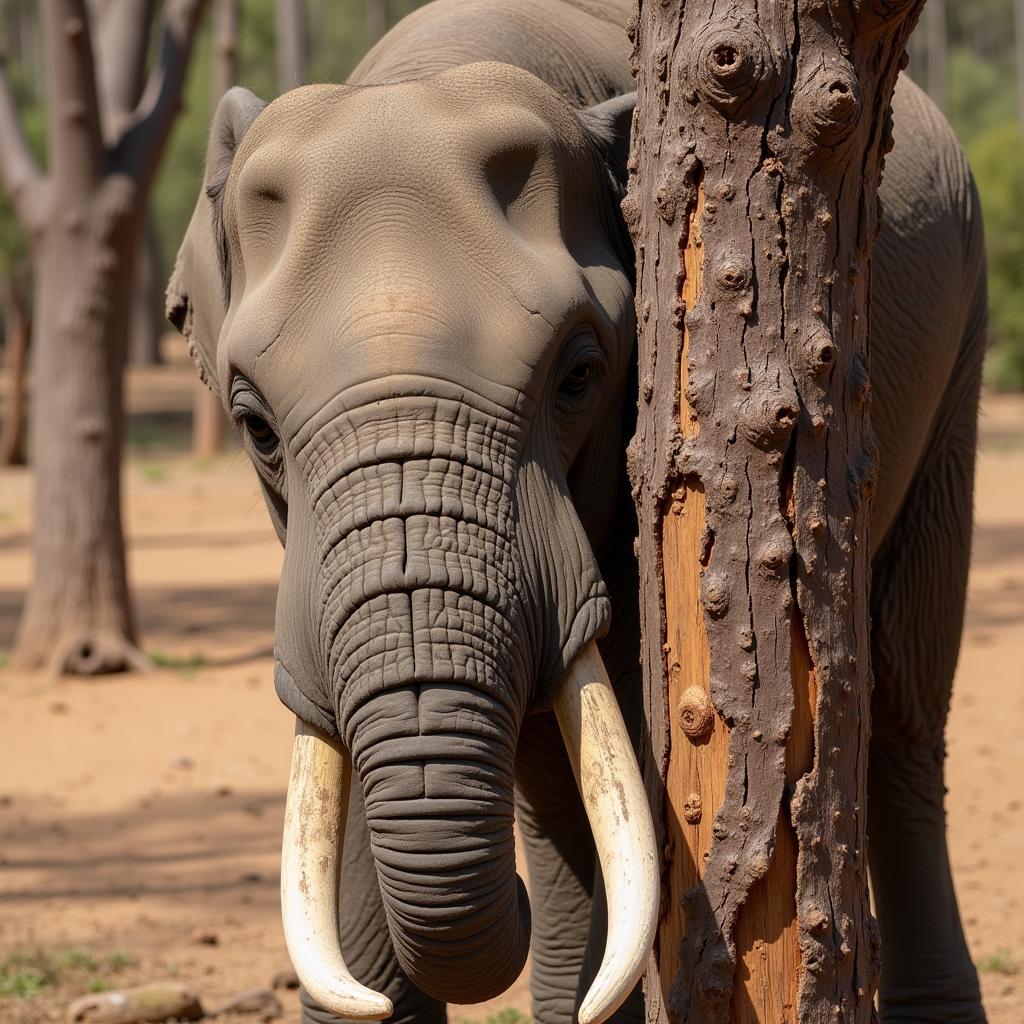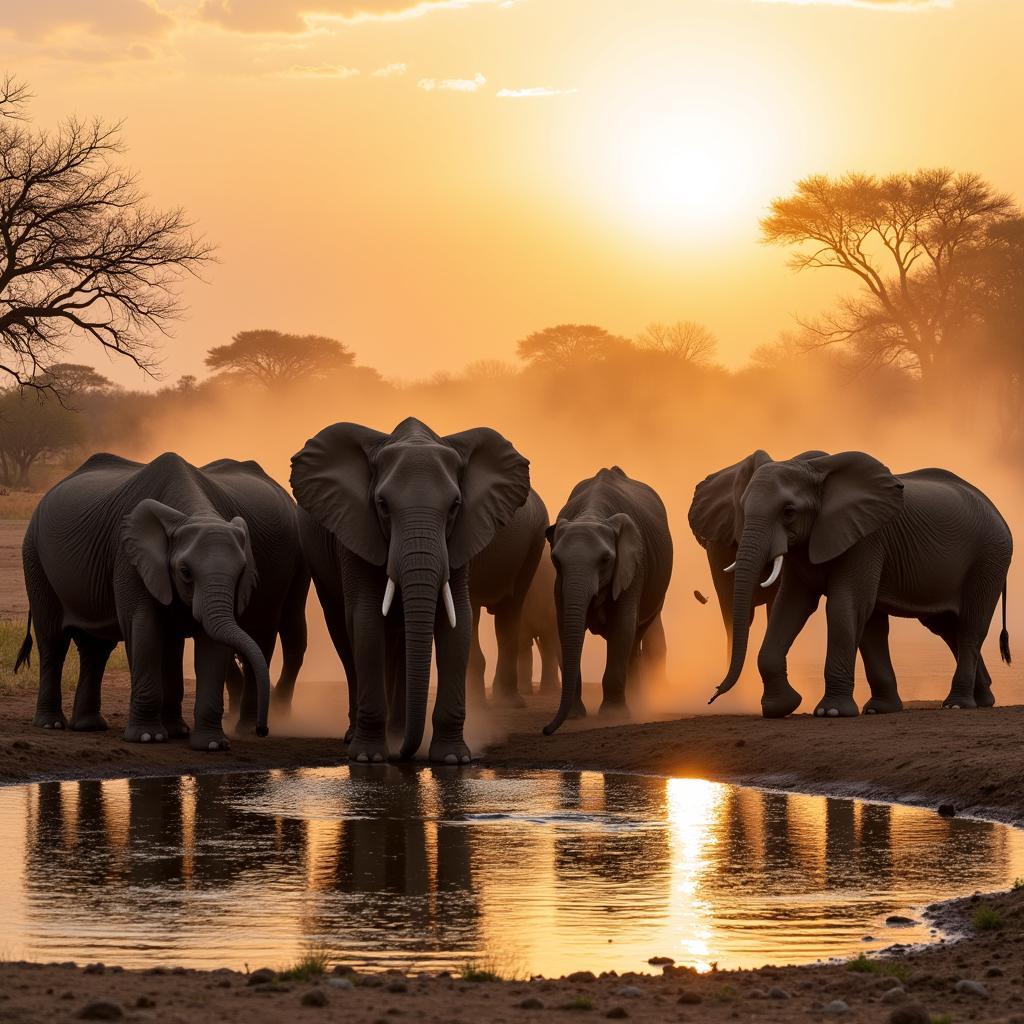The Majestic African Elephant Eating Habits
The African elephant, a majestic giant roaming the savannas and forests, captivates us with its sheer size and complex social behaviors. But have you ever wondered about the intricacies of the African Elephant Eating? Their diet plays a crucial role in shaping their environment and sustaining their immense bodies. Let’s delve into the fascinating world of these gentle giants and explore what fuels their existence.
Understanding the African Elephant’s Diet
African elephants are herbivores, meaning their diet consists entirely of plant matter. Their daily intake is astonishing, reaching up to 300 pounds of food and 50 gallons of water. This enormous appetite necessitates a diverse diet encompassing a variety of plant species. From grasses and leaves to bark and fruit, African elephants consume a wide range of vegetation, adapting their food choices based on seasonal availability and regional variations. This adaptability is key to their survival in diverse habitats across the African continent. Check out this fascinating diorama showing their natural habitat: african elephant habitat diorama.
What do African Elephants Eat in the Dry Season?
During the dry season, when lush vegetation becomes scarce, African elephants demonstrate their resourcefulness. They utilize their powerful tusks and trunks to dig for roots and tubers, accessing hidden sources of nutrients beneath the parched earth. Their ability to strip bark from trees also provides sustenance during these challenging times, although it can significantly impact tree populations.
What do African Elephants Eat in the Wet Season?
The wet season brings a welcome abundance of fresh growth, transforming the landscape into a verdant buffet for African elephants. They feast on a variety of grasses, leaves, and fruits, relishing the readily available bounty. This period of plenty allows them to replenish their energy reserves and build up fat stores.
The Importance of African Elephant Eating Habits
The African elephant’s eating habits have a profound impact on the surrounding ecosystem. Their foraging activities help shape the landscape, creating clearings and pathways that benefit other animals. Their consumption of fruits and seeds also plays a crucial role in seed dispersal, contributing to the regeneration of plant life. Understanding their dietary needs is essential for conservation efforts, especially as human encroachment continues to threaten their habitats. For information on the African bush elephant population, see african bush elephant population 2019.
How Much Does an African Elephant Eat?
As mentioned earlier, an adult African elephant can consume an astounding amount of food – up to 300 pounds daily! This massive intake is necessary to sustain their enormous bodies and fuel their active lifestyle.
How Often Does an African Elephant Eat?
African elephants spend a significant portion of their day, up to 16 hours, foraging for food. This constant grazing is essential to meet their substantial dietary requirements.
 African Elephant Stripping Bark from a Tree
African Elephant Stripping Bark from a Tree
“The feeding habits of African elephants are a complex interplay of ecological factors and physiological needs,” explains Dr. Amani Jabari, a renowned wildlife biologist specializing in African elephant behavior. “Understanding these intricacies is crucial for effective conservation strategies.”
The Impact of Human Activities on African Elephant Eating
Human activities, such as habitat destruction and agricultural expansion, pose significant threats to African elephants and their access to food. As human populations grow and encroach upon elephant territories, competition for resources intensifies. This can lead to human-wildlife conflict, with elephants sometimes raiding crops in search of sustenance. Learn more about African jungle wildlife here: african jungle wildlife.
Dr. Jabari further notes, “Protecting elephant habitats and ensuring their access to adequate food sources are paramount for the long-term survival of these magnificent creatures.”
How Does Habitat Loss Affect African Elephant Eating?
Habitat loss reduces the availability of food and water, forcing elephants to travel longer distances in search of sustenance, increasing their vulnerability to poaching and other threats.
What Can Be Done to Protect African Elephants and Their Food Sources?
Conservation efforts, such as establishing protected areas and promoting sustainable land management practices, are crucial to mitigating the impact of human activities on African elephant populations.
 African Elephant Drinking Water at a Waterhole
African Elephant Drinking Water at a Waterhole
Conclusion
The African elephant eating habits are a testament to their adaptability and resilience. From their diverse diet to their impact on the ecosystem, these gentle giants play a vital role in the intricate web of life in Africa. Protecting their habitats and ensuring their access to food are essential for the continued survival of these magnificent creatures. For an immersive experience, explore the african jungle life documentary.
FAQ
- What is the main food source for African elephants? Plant matter, including grasses, leaves, bark, and fruit.
- How much does an African elephant eat in a day? Up to 300 pounds.
- How does the dry season affect their diet? They dig for roots and tubers, and strip bark from trees.
- How do elephants contribute to the ecosystem? They shape the landscape and disperse seeds.
- What are the main threats to African elephants and their food sources? Habitat loss and human encroachment.
- How long do elephants spend foraging for food each day? Up to 16 hours.
- Why is it important to understand African elephant eating habits? For effective conservation strategies.
More Questions to Explore
- How do elephant herds organize their foraging activities?
- What are the nutritional needs of African elephants?
- What role do elephants play in seed dispersal?
- How does climate change impact their food sources?
For further information on African culture, you might be interested in 10 best african hot movies.
For any assistance, contact us at +255768904061, email [email protected] or visit us at Mbarali DC Mawindi, Kangaga, Tanzania. Our customer service team is available 24/7.


